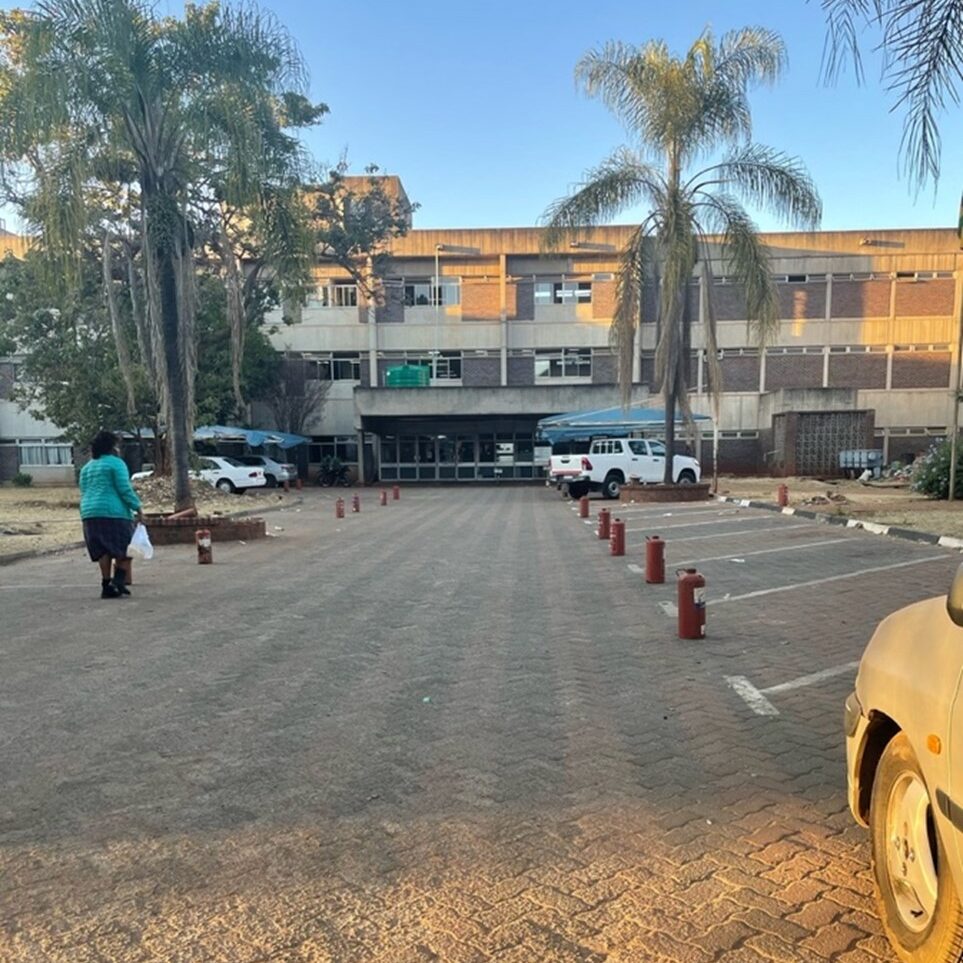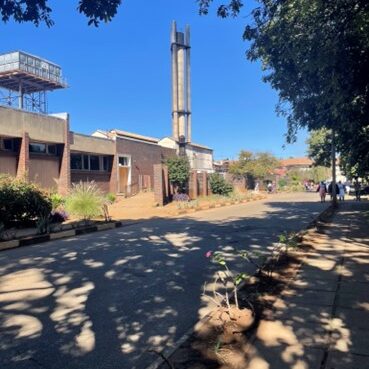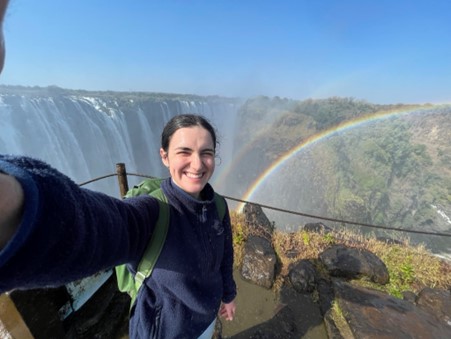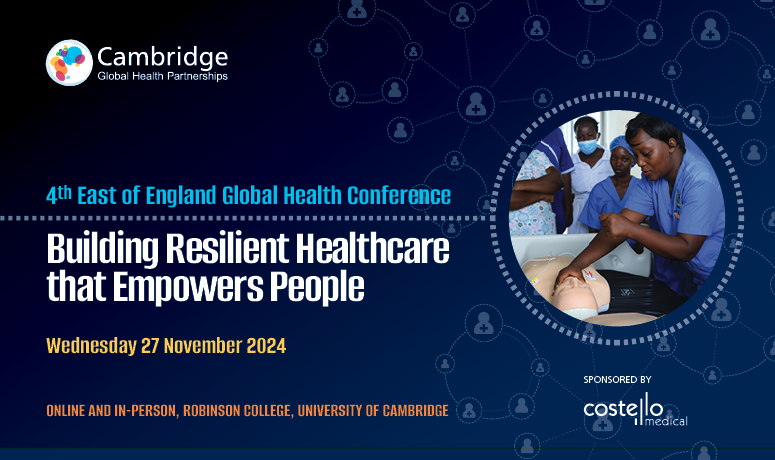Medical student Anna Cook travelled to Zimbabwe for her ethical elective where she surveyed general medicine registrars to better understand their knowledge and expertise in the management of HIV.
“I’ve been interested in global health since considering a career in medicine. I’m particularly interested in infectious diseases, in which global cooperation and sharing of knowledge and resources is essential, as the COVID-19 pandemic demonstrated.
The ethical elective opportunity with CGHP seemed like a good opportunity to contribute positively to both my community and the one I was travelling to. The partnership with Zimbabwe focuses on education of doctors in training in the diagnosis and management of infectious diseases. Currently this takes the form of monthly case-based discussions between infectious diseases trainees in Addenbrooke’s Hospital in Cambridge and general medicine registrars in Parirenyatwa Hospital in Harare. However, there is a plan to try to expand this to develop a shared HIV medicine education programme, where each location will provide teaching about areas of expertise in HIV medicine. The hope is that the programme will help improve the knowledge and confidence of doctors in training in both Zimbabwe and the UK in the management of people living with HIV.


Assessing current knowledge
As part of the development of the HIV medicine education programme, my elective was an opportunity to complete a survey of medical registrars in both the UK and Zimbabwe to gain an understanding the doctors’ areas of expertise and confidence manging HIV and associated conditions.
Prior to travelling to Zimbabwe, I attended the monthly case-based discussion between Harare and Cambridge. We also had regular meeting to develop the survey and discuss what questions would be of most value for developing the programme. Getting the ethics approval needed for Zimbabwe took longer than anticipated, but luckily I met doctors in Zimbabwe who offered to help me complete the survey remotely.
During the four weeks in Harare I was attached to a general medicine ward at Parirenyatwa Hospital, which also ran the Kaposi sarcoma and cardiology clinic for the hospital. I spent time on the ward helping with jobs, such as taking bloods and writing notes. Dr Robertson, the consultant involved in the partnership in Zimbabwe, also organised for me to visit Newlands outpatient clinic which specialises in the care of people living with HIV.
The partnership is based on the principle that all doctors are experts, and we can learn from each other, rather than one partner teaching the other. This was the theme of my elective as I learnt a vast amount from the doctors I met in Zimbabwe who were experts in what they manage on a day-to-day basis.

Building relationships in person
Organising ethics approval was one of the most stressful aspects of the trip, as completing the survey was one of the main reasons I travelled Zimbabwe. However, it would have been more difficult to organise remotely: being there allowed me to discuss and address issues quickly and I had a lot of help from the doctors involved in the partnership. I also met people who will help me complete the survey remotely, so what could have been a bit of a disaster now just means that getting results will take longer than anticipated.
While English is widely spoken in Zimbabwe, most patients spoke Shona as their first language, making communication more of a challenge than I’d expected. This made taking histories or doing ward jobs more difficult as I sometimes had to rely on other people to translate. It also meant I couldn’t help by clerking patients for the doctors in A&E.
The most rewarding part of the trip was learning so much from all the doctors I met. They were truly excellent teachers, and I am a far better practical clinician for it. I also feel much better prepared to treat patients not just from the East of England as I have broadened my experience, skills and knowledge. For example, I am more able to identify and assess patients with Kaposi’s Sarcoma (KS), which we do not experience commonly in medical training in the East of England.
Growing in confidence
I travelled to Zimbabwe alone and spent the first few days wondering what I had done as I was in a different country by myself where I knew only a couple of people. However, this experience made me more independent and confident in my own abilities. I also had to rely on the knowledge, advice, and kindness of others to help me navigate the hospital and the country. This was very easy as everyone was infinitely kind and made me feel welcome. In particular I would like to say thank you to the doctors and other elective students on the ward for making me feel so welcome. I’m also now very good at crossing a 6-lane road with no pedestrian crossing!

Professional development
This experience has helped me understand the work involved in developing a global health project, and how to work with partners. In particular when things might not go exactly to plan, how to adapt and change or find other solutions.
Being able to attend the wards and clinics at Parirenyatwa Hospital allowed me to learn about areas of medicine which I haven’t seen in my medical training but may well encounter in my career. Attending Kaposi Sarcoma clinics allowed me to see many patients living with KS, appreciate the broad range of ways it can present beyond textbook definitions, and see how it is treated by doctors who are experts in managing these patients.
I am far more confident in examining patients too, as taking a thorough history is essential to minimise the investigations needed, saving the both the patients’ money and the hospital’s resources. It has made me think more about resources we use: in Zimbabwe every test, treatment, and day in hospital must be justifiable as resources are limited and patients have to fund their own care. In the NHS, we don’t always see the cost of our investigations or how ordering tests affects other patients’ ability to access care, which means we might carry out investigations that aren’t completely necessary or could cause harm.
A close call with a baboon
A highlight of my trip was seeing Victoria Falls, which were spectacular and the one thing I was told by everyone to do in Zimbabwe. Although I was charged by a baboon as they had seen my lunch and decided they wanted it. The lunch had to be forfeited. I definitely should have known better considering the number of David Attenborough documentaries I’ve watched.
I would absolutely recommend global health work to my peers; I know I will be a far better doctor to my patients having done it. It also is really rewarding to share knowledge, and I love to be involved in teaching and learning which is central to global health.
Looking ahead
I will stay involved in the development of this programme once we have results for the survey and hope my experience will provide useful insights and potentially encourage other parties to get involved. My elective cemented for me that, if possible, I would like to make global health and education part of my career as I really enjoyed being able to learn and discuss medicine with the doctors in Zimbabwe.”
Find out more about Anna’s experience at the 4th East of England Global Health Conference where she will be speaking about the development of the HIV medicine education programme. Book you ticket

Return to blogs
